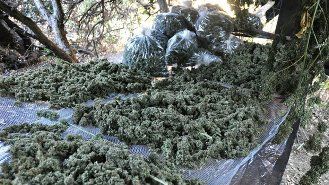Sac Bee ignores drug cartels in pot farming story

Instead of blowing the lid off of the growing pot-farming problem in some Northern California areas, the Sacramento Bee did a lightweight opinion story Sunday on Butte County, never once addressing the Mexican drug cartels behind many of the illegal pot farms, which are flourishing because of the state’s medical marijuana law and inadequate regulation.
 Bee editorial writer Dan Morain couldn’t resist taking several cheap shots at Assemblyman Dan Logue, a Republican from the 3rd Assembly district covering all of Yuba, Tehama, Sutter, Glenn counties, and parts of Butte and Colusa counties. Logue has complained about the lack of concern over the environmental degradation associated with the pot farms. Morain responded with mockery.
Bee editorial writer Dan Morain couldn’t resist taking several cheap shots at Assemblyman Dan Logue, a Republican from the 3rd Assembly district covering all of Yuba, Tehama, Sutter, Glenn counties, and parts of Butte and Colusa counties. Logue has complained about the lack of concern over the environmental degradation associated with the pot farms. Morain responded with mockery.
“Not someone to be mistaken for John Muir, Logue led the effort a few years back to roll back AB 32, the measure to limit greenhouse gas,” Morain said. “Cagey politician that he is, Logue also knows an issue when he sees it.”
Characterizing this as political opportunism on Logue’s part instead of a politician reacting to constituents’ concerns is snide and unfair. There is also this angle: Would you want to be known as the politician vociferously outing cartel-planted pot farms? We know what happens to the good guys in Mexico. Logue deserves credit, not cheap shots.
Too dangerous to deal with?
Money, unsurprisingly, is driving this problem. Marijuana is the largest cash crop in the state. The annual crop is approximately 8.6 million pounds — worth about $14 billion, according to a 2010 RAND study.
The California health and safety code does not allow any individual or group to cultivate or distribute marijuana for profit. But a big problem is the ambiguity of the cultivation law. “Cultivation of any amount of marijuana is a felony under Health and Safety Code 11358. People who grow for personal use are eligible for diversion under Penal Code 1000 so long as there is no evidence of intent to sell.” However, the law does not specify a fixed plant number which limits for personal use. This has led to people creating small pot collectives by pooling numerous permits for a larger growing area.
Yet unlike the Bee’s Morain, other reporters have noted that the problem is driven by organized crime — specifically, Mexican cartels.
The Associated Press recently detailed the extent of the problem in Butte County. “With parts of Northern California’s scenic hillsides illegally gouged by bulldozers for marijuana grows, frustrated local officials asked the state for help to protect streams and rivers from harmful sediment and the chemicals used on the pot plants,” the AP said. “As in many rural counties in California, marijuana farms are becoming more and more plentiful. They proliferate in the high Sierra, where armed Mexican cartel operatives clear wilderness areas, divert creeks and poison wildlife.”
Logue told me what the pot growers are doing to rural counties amounts to strip mining. “It looks like the Malakoff Diggins,” California’s largest hydraulic mine, Logue said of the forest areas where pot farms are located.
They are trashing forest areas, illegally cutting trees normally protected by the state, and dumping illegal poison into streams and creeks. Hillsides are illegally stripped by bulldozers for marijuana farms, creating significant erosion problems.
Environmental laws going unenforced
But county and state officials are not enforcing the state’s laws against any of this.
“Frustrated local officials asked the state for help to protect streams and rivers from harmful sediment and the chemicals used on the pot plants,” the AP reported.
“They hoped to charge growers under federal and state clean water regulations with tougher penalties than the infractions local officials could impose. But they were rebuffed.”
“It’s too dangerous, the state agency in charge of protecting the region’s water said in a letter to county supervisors.”
“’We simply cannot, in good conscience, put staff in harm’s way,’ wrote Central Valley Regional Water Quality Control Board Executive Director Paula Creedon,” reported the AP. “The state’s nine regional water boards are quasi-independent agencies that set their own policies, though all are charged with enforcing the federal Clean Water Act and its California equivalent.”
Some county officials said they are concerned about the harassment of legitimate, legal property owners, while the state ignores the illegal pot farmers, and the destruction they are causing.
Logue said he got involved because of the refusal by the water board to act, and sent a letter to to Creedon expressing concern over the “diminishing water quality in this part of my district.” He asked the agency to help find a way to enforce the Clean Water Act. Logue has also asked for a meeting with members of Gov. Jerry Brown’s staff in an attempt to force action.
“This has to be fixed,” Logue said in an interview. “We have an issue in the state where agencies are fearful, and the law isn’t being applied equally.”
“Why aren’t they protecting the environment now?” Logie asked.
‘Compassionate Use Act’ cleared way for cartels
California Proposition 215, also known as the Medical Use of Marijuana Initiative or the Compassionate Use Act, was passed by California voters in 1996.
 The passage of Proposition 215 was considered a significant victory for medical marijuana. It exempts patients and defined caregivers who possess or cultivate marijuana for medical treatment recommended by a physician from criminal laws which otherwise prohibit possession or cultivation of marijuana. Because of Proposition 215, California is one of the fourteen states that allow marijuana for medical uses.
The passage of Proposition 215 was considered a significant victory for medical marijuana. It exempts patients and defined caregivers who possess or cultivate marijuana for medical treatment recommended by a physician from criminal laws which otherwise prohibit possession or cultivation of marijuana. Because of Proposition 215, California is one of the fourteen states that allow marijuana for medical uses.
When California’s Prop. 215 was on the ballot in 1996, the Los Angeles Times did a story on wealthy large donors to the cause, including the biggest contributor, George Soros. “The campaign’s biggest donor is George Soros, a billionaire international investor and New York philanthropist who donated $550,000 to Proposition 215,” the LA Times said. “He also contributed $430,000 to a medical marijuana measure that is on the ballot in Arizona.”
Most recently, California voters defeated Proposition 19, the “Regulate, Control and Tax Cannabis Act of 2010,” on the Nov. 2, 2010 California statewide ballot.
Related Articles
Another small biz bites the dust
Oct. 1, 2012 Katy Grimes: The news that another small Sacramento business is closing its doors seems only to draw yawns
FPPC imposes regulation on political bloggers
The California Fair Political Practices Commission just ruled this week to require campaign committees to report to the State who they
Electric cars most popular in CA
They’re still only a fraction of car sales. But all those Teslas and Leafs you see on the road are




